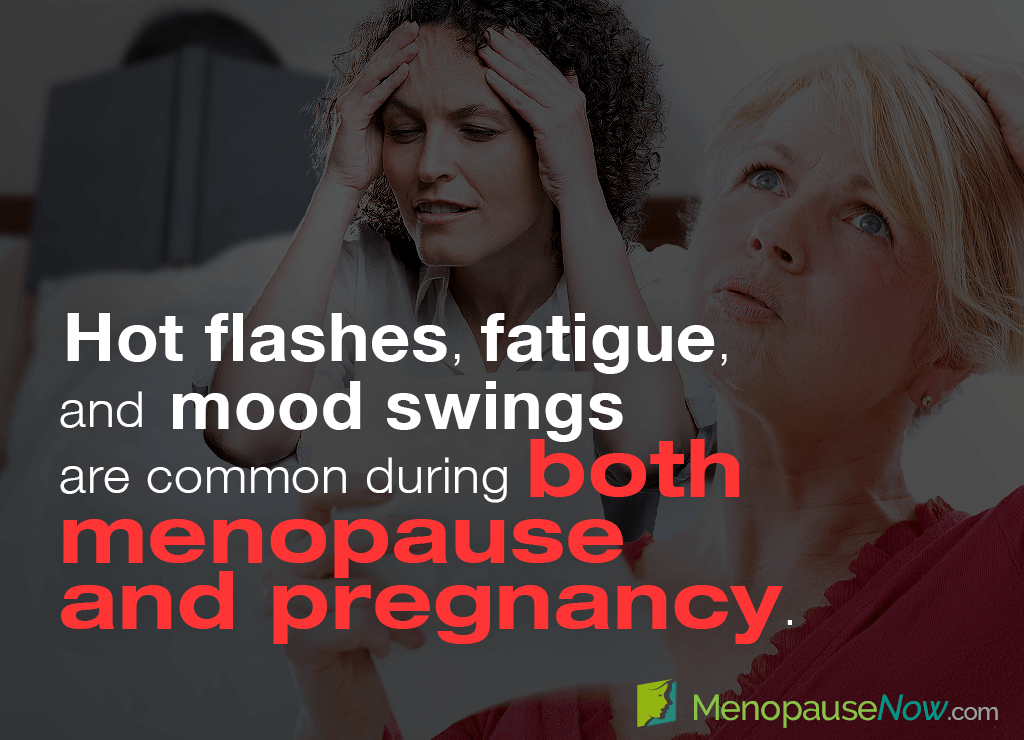When about to end fertile years, there are a number of menopause symptoms that evolve due to drastic hormonal fluctuations. However, some of these bodily changes are similar to the classic symptoms of pregnancy, possibly leading women to wonder which life experience they are about to undergo.
Continue reading to learn the difference between symptoms of pregnancy and menopause so that you can gain control of your reproductive health one step at a time.
What's the Difference?
Without a doubt, some menopause and pregnancy symptoms are similar as both life stages are characterized by drastic hormonal fluctuations.
Generally, women should take their age, sexual history, and other symptoms into consideration when trying to decide if they are actually pregnant or just about to transition out of reproductive years.
Perimenopause generally begins in a woman's mid- to late-40s and lasts an average of four years with the average age of menopause being 51.1,2 However, premature or early menopause can begin earlier, in some cases as early as a woman's 30s.
Menopause Symptoms Similar to Pregnancy
Below is a list of menopause symptoms similar to pregnancy:
Irregular Periods
The first classic symptom of pregnancy is often a missed period, with 29 percent of women reporting so.3 However, a missed period can also be part of irregular periods, which often are the first indication that a woman has officially entered perimenopause.
Mood Swings
Experiencing mood swings can be related to premenstrual syndrome (PMS), menopause, or pregnancy. Hormones - namely estrogen and progesterone - interact in similarly erratic ways during all three of these times.
Exhaustion
Extreme fatigue can occur during menopause on its own or as a result of insomnia, night sweats, anxiety, and a host of other symptoms. Also, when a woman is pregnant, she may feel more tired during the first trimester as her body prepares to nurture the fetus and adjusts to the vast amount of hormones present.
Hot Flashes
Most people think that hot flashes are solely a symptom of menopause, but the truth is that pregnant women can suffer from them as well. Scientific research has found that just over a third of expectant mothers suffer from hot flashes during pregnancy.4
Recommendations
The easiest way to tell if your symptoms are due to pregnancy is by taking a home pregnancy test or a blood test at your doctor's office. However, taking the test too early can produce an inaccurate result as the body might not have enough time to produce pregnancy hormones. As such, it is best to take the test 7 to ten days after a missed period.
Also, middle-aged women who are concerned about falling pregnant should consider birth control during perimenopause to prevent an unexpected pregnancy.
Keep in mind that there are many other conditions that could be causing symptoms, such as polycystic ovary syndrome (PCOS), thyroid disease, or endometriosis. So, if pregnancy and perimenopause are both ruled out, continue investigating until the underlying cause is found.
Nevertheless, rest assured that bothersome menopause symptoms - no matter how frequent or intense - can be managed. Click on the following link to learn about menopause symptoms treatments that naturally and effectively bring you toward an improved quality of life.
Sources
- Mayo Clinic. (2019). Symptoms of pregnancy: What happens first. Retrieved October 31, 2019, from https://www.mayoclinic.org/healthy-lifestyle/getting-pregnant/in-depth/symptoms-of-pregnancy/art-20043853
- MedlinePlus. (2018). Common symptoms during pregnancy. Retrieved October 31, 2019, from http://www.nlm.nih.gov/medlineplus/ency/patientinstructions/000583.htm
- Office on Women's Health. (2017). Menopause basics. Retrieved October 31, 2019, from https://www.womenshealth.gov/menopause/menopause-basics/
Footnotes:
- Cleveland Clinic. (2019). Menopause, Perimenopause and Postmenopause. Retrieved October 31, 2019, from https://my.clevelandclinic.org/health/diseases/15224-menopause-perimenopause-and-postmenopause
- Mayo Clinic. (2017). Menopause: Symptoms & causes. Retrieved October 31, 2019, from https://www.mayoclinic.org/diseases-conditions/menopause/symptoms-causes/syc-20353397
- American Pregnancy Association. (n.d.). Pregnancy Symptoms - Early Signs of Pregnancy. Retrieved October 31, 2019, from https://americanpregnancy.org/getting-pregnant/early-pregnancy-symptoms/
- Thurston, R.C. et al. (2013). Prospective Evaluation of Hot Flashes during Pregnancy and Postpartum. Fertility and Sterility, 100(6), 1667-1672. doi: 10.1016/j.fertnstert.2013.08.020




